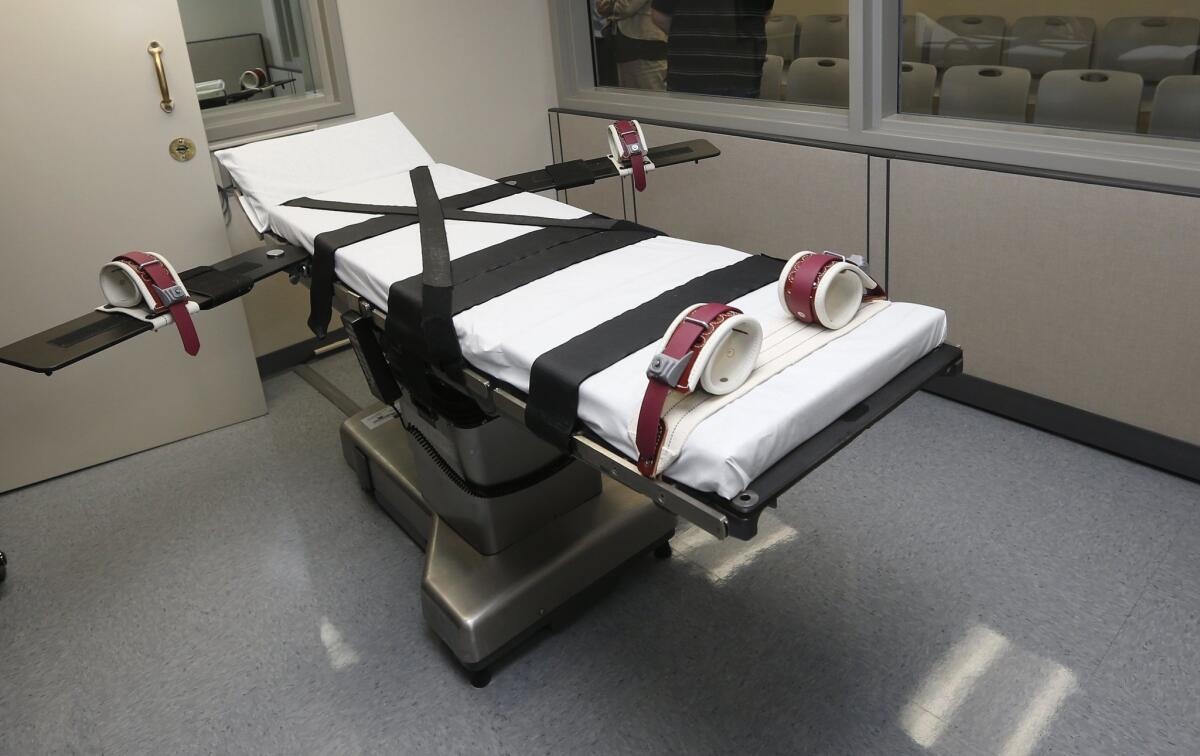Editorial: Clock is ticking on Californiaâs lethal injection question

On June 29, the Supreme Court voted 5-4 that the sedative midazolam can be used in executions without violating the Eighth Amendment prohibition on cruel and unusual punishment. Above, an October, 2014 shot of the gurney in the the execution chamber at the Oklahoma State Penitentiary in McAlester, Oklahoma.
One of the silver linings of Mondayâs Supreme Court ruling in Glossip vs. Gross, which upheld Oklahomaâs objectionable three-drug execution protocol, was a compelling dissent by Justice Stephen G. Breyer arguing that it is âhighly likely that the death penalty violates the 8th Amendmentâ and urging the court to âcall for full briefing on the basic question.â
Unfortunately, the case weighed only whether Oklahomaâs use of midazolam â a numbing sedative â rather than a barbiturate that would induce a coma-like state creates an unconstitutional risk of âcruel and unusualâ punishment. The court ruled 5 to 4 that three convicted murderers facing execution with the drug failed to make their case.
As narrow as the ruling was, it will have an impact in California, where legal challenges to the stateâs three-drug protocol have delayed executions for nearly a decade. Rather than continuing to defend the protocol (which did not include midazolam), Gov. Jerry Brown three years ago ordered state corrections officials to devise a new single-drug protocol. Accusing the state of dragging its feet, victimsâ relatives sued to force the issue, a lawsuit the state recently settled by promising to unveil the new execution method within 120 days of the decision in the Oklahoma midazolam case.
So the clock has begun to tick, although with a regulatory review of any new protocol and two unrelated legal challenges in progress, there will be no near-term resumption of executions. And death row just gets more crowded. Since the stateâs last execution in 2006, juries have imposed an average of 18 death sentences a year, and the current death row population stands at 750.
The grotesque flaws of capital punishment are manifest, and Breyer (joined by Justice Ruth Bader Ginsburg) addressed many of them in his dissent. There is compelling evidence that innocent people have been executed over the years; indeed, some 115 condemned murderers nationwide have been exonerated since 2002. At its heart the practice is immoral â no government should be in the business of killing its own citizens.
The California Legislature should put an abolition initiative on the 2016 ballot. Yes, voters narrowly rejected such a proposition in 2012, but the spate of exonerations and the focus on miscarriages of justice might have changed enough minds to make a difference.
Brown, Lt. Gov. Gavin Newsom and Atty. Gen. Kamala Harris all oppose capital punishment, and they should make ending it a political priority. Brown could further help by using his legal authority to convert existing death sentences to life in prison without possibility of parole. Rather than resuming executions, the state should end the practice.
Follow the Opinion section on Twitter @latimesopinion and Facebook
More to Read
A cure for the common opinion
Get thought-provoking perspectives with our weekly newsletter.
You may occasionally receive promotional content from the Los Angeles Times.










